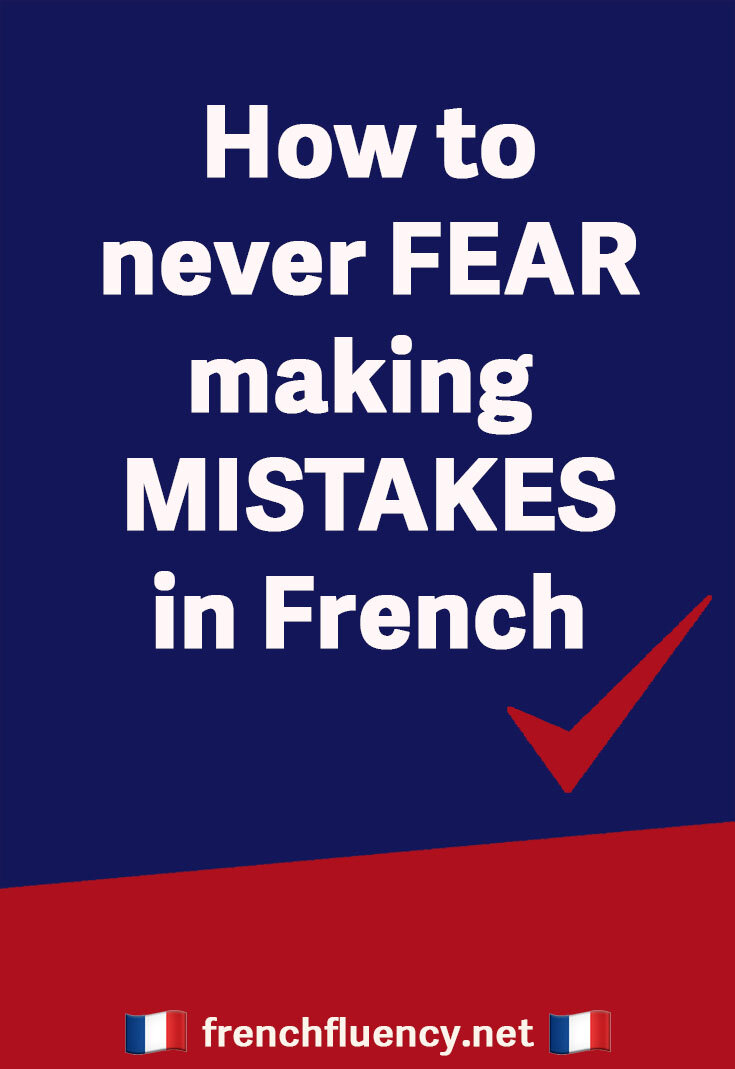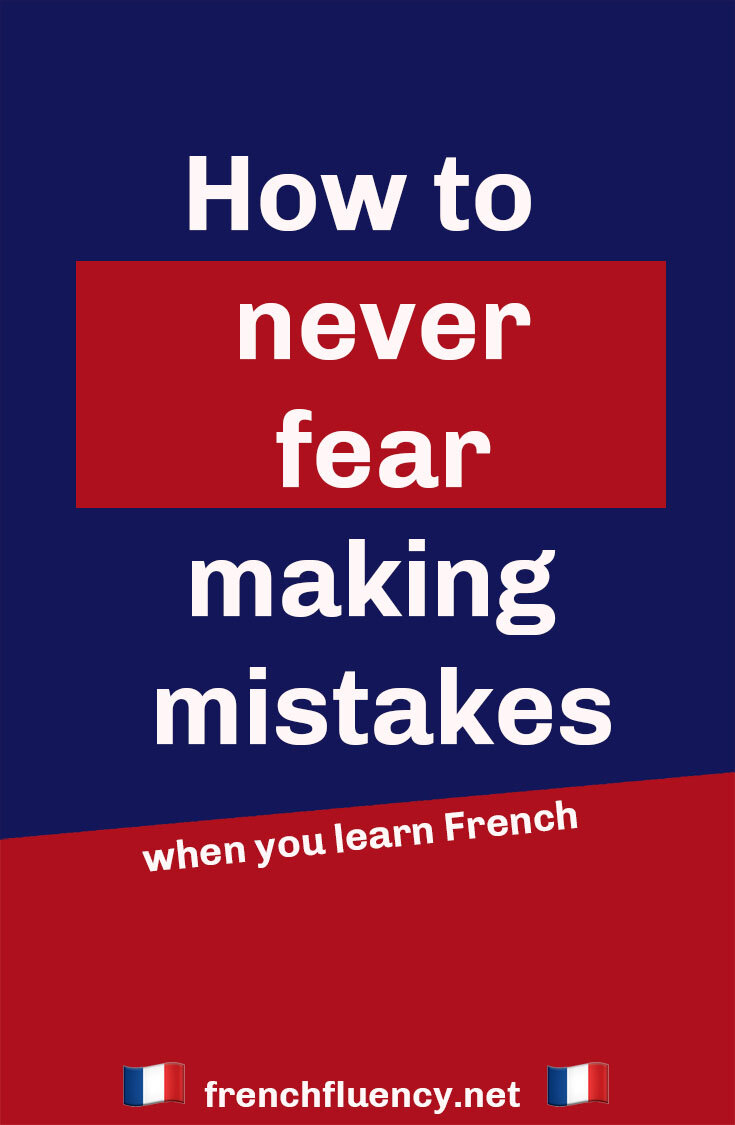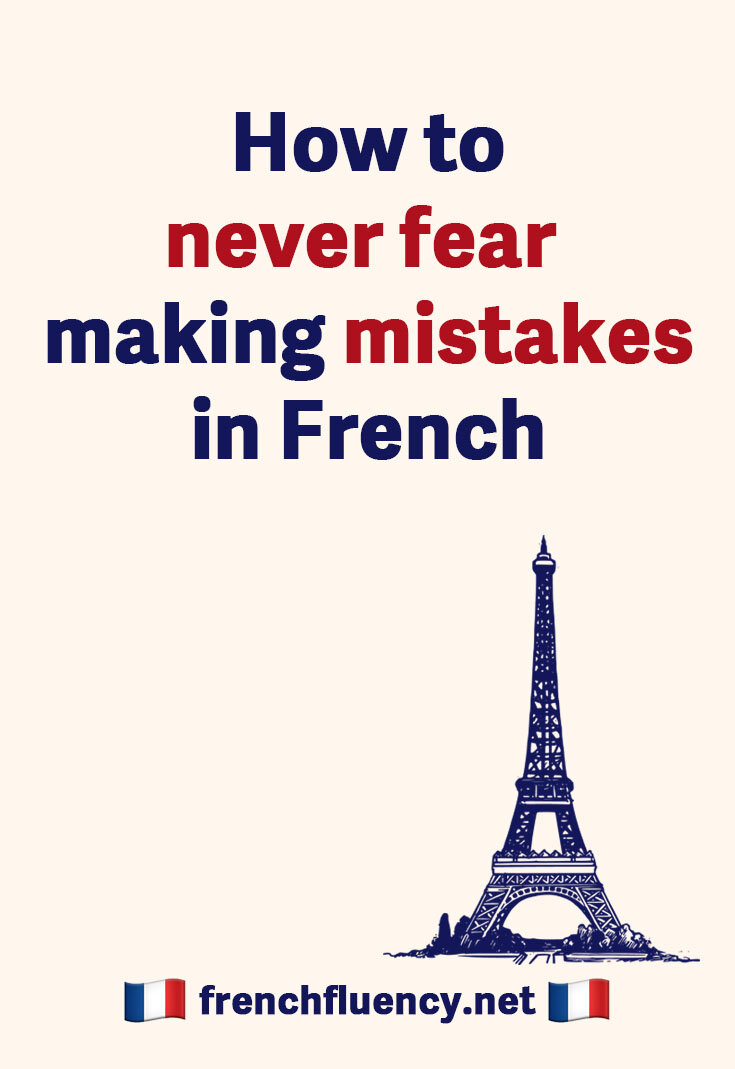How to never fear making mistakes when you speak French
As a French learner, you might find yourself held back by the fear of making mistakes. Or you might feel bad about the number of mistakes you make. Either way it’s neither enjoyable nor necessary.
So today we’re looking into what causes this and what you can do to overcome it.
I will also share three things that mistakes will do for you, once you embrace them. These will help you learn French faster and feel more confident about the process.
If you like this video, click here to subscribe to my YouTube channel. I frequently make new videos all about French language & culture and how you too can become a French speaker.
What does it take to become a French speaker?
One of the things it takes to learn French is to feel somewhat confident about your ability to learn, which means not being too afraid of making mistakes.
To tell the truth, most mistakes are harmless and even beneficial.
In fact, there are only two very specific mistakes which are deadly and which you should avoid at all costs. I’ll share them at the end of this article.
Other than those two, I truly believe that mistakes are a good thing and I’ll show you why in a moment.
But first, let’s look at where that idea comes from.
Why do we tend to believe that mistakes are bad?
When you were a child, you probably went to school.
I don’t mean to always blame the school system, I’ve already written an article about why regular schools just aren’t the best place to learn French. But once again, school is where the issue started.
Most schools around the world use mistakes as a way to sanction, rather than an opportunity to improve.
Avoiding mistakes = being successful?
At school, mistakes are used to grade your papers and decide on your future opportunities - and worse than that, sometimes mistakes are used to shame the student and make them feel not good enough.
Adults should never shame children, but almost every one of us can remember a time when that happened. For most of us, it happened more than once.
This often leads to connecting our value in the social group or market place or even our own self-worth to our ability to avoid mistakes.
Many people do build success on how few mistakes they make. If you’re like most of my clients, you probably did too. You have degrees, a career, and if you’re old enough for that, you might also have built a beautiful family.
Clearly you have done many things “right”. Perhaps you’ve always been a good student and a good employee and doing things right is what you do. You’re not the kind of person who makes many mistakes.
This attitude has served you well and I see why you’d want to keep it.
So, naturally when you decide to learn French, you’d bring this attitude with you. Especially if you seek out a teacher. You certainly remember from your school days: teachers hate mistakes. And you sure don’t want to disappoint them by doing something they hate.
Now, I’m not a teacher, I’m a coach and my way of approaching mistakes is radically different. I believe mistakes are great and I’ll show you why in a minute.
Mistakes as the path to success?
Coaching finds its origin the fields of personal development and entrepreneurship. In that field, the way we look at mistakes and even “failure” is quite special.
You’ll find quotes like:
“an entrepreneur only needs to be right once”
or “there’s no such thing as failure, only feedback”
or FAIL stands for “first attempt in learning”.
Which is completely opposite to the very wide-spread attitude of trying to avoid mistakes and failure at all costs in order to succeed, which we just described. On the contrary, in those fields, mistakes and failures are seen as steps on the way to success.
So how come we ended up with these two very opposite attitudes, both of which can lead to success?
Why this contradiction?
To understand this, you need to understand the difference between what I’d call a charted territory vs uncharted territory.
Charted territory
A charted territory is any learning experience which is already formalised.
Other people have conceived a program before you attempted to take that program. There are rules to follow and someone has already decided what mistakes you need to avoid to be successful. Often, there will also be an exam, and you’ll only pass if you avoid enough mistakes.
Charted territory includes most schools, universities and training programs you might have taken in the past. These experiences are like an existing mould and you just have to make yourself fit into that mould. Avoiding mistakes is the way you fit in.
As a side note, some personalities will fit a particular mould better than others and you might succeed or fail based not only on your work ethic, but also on things outside of your control like your own learning style and your personality. If your personality fits the expectations, you’re very likely to succeed. If it doesn’t, it will be a lot harder for you.
If you’re a trainer or a parent you know that very well. So, a fixed program isn’t always better, even when it exists.
And it doesn’t always exist. Most existing training programs exist with the goal to transfer knowledge and skills to people so they can get a degree and/or be competent for jobs that are in demand.
This means that whenever you want to create something that doesn’t already exist, or you want to gain skills that are specific to you or to a group of people not large enough for a training to exist already, you’ll be, literally, in uncharted territory.
Uncharted territory
There will be no set curriculum, or the curriculum will be new &/or personalised for you.
Often, there will be no exam. Now the criteria for success isn’t whether or not you can fit in a pre-set mould by avoiding mistakes and/or pass an exam.
It’s whether or not you’ll be able to do what you want to do as a result of your learning experience. And this is a radically different situation.
Most of the time,
Learning French as an adult falls into this category.
It’s one thing to take a class and pass an exam.
It’s an entirely different thing to learn the French skills you need in your own life and to successfully start speaking French when you need it, whether it’s at work, when you’re traveling, or even at home if you have a multicultural family.
On the one hand this is great because now, your personality and your learning style can’t be an obstacle anymore. They will be components of the experience that need to be taken into account, for you to succeed.
On the other hand, this is all very challenging to navigate because, well, you are in uncharted territory. This is why you might be feeling overwhelmed or lost. Or feel that what you learn just isn’t relevant and you aren’t making the progress you’re looking for. And this is completely normal.
In this situation, mistakes are not only unavoidable, they’re actually very useful.
As a coach, working with you in this uncharted territory, I create your curriculum from scratch and a big part of it is created or fine-tuned as we go. In this process, we absolutely need you to make mistakes, for three reasons.
One caveat, because I can already hear the little voice saying “yeah but sometimes mistakes can have dire consequences”. This is true. You don’t want to make a mistake at the wrong moment or in front of the wrong person, which is why I also advocate for practicing in a safe space, where nothing you say can be held against you. But that’s a topic for another article.
For now, you just want to make sure that you are practicing with compassionate people who have your best interest at heart, or at the very least in situations where there won’t be any bad consequence if you make a mistake.
Provided you are practicing in a safe space, and with an experienced trainer, mistakes will be your best friends.
Why you need to make mistakes
Three reasons why as a French learner in uncharted territory, you actually NEED to make mistakes, and what these really look like from the point of view of your coach.
When you speak or write to me in French, I get a snapshot of your current level.
The mistakes you make show me three very important things:
Your current level
Your mistakes show me where you’re at, how much of the language have you learned so far?
This is very useful because a student is rarely a complete beginner, and it’s important to know what has been learned in the past so we avoid wasting time repeating things you already know.
2. How you can improve
Your mistakes show me how you can improve, for example, do we need to review some previous lesson points because you haven’t assimilated them yet?
Even though learning French is uncharted territory for you, there are still certain things that you need to learn before being able to move on to other elements of the language. It’s like building a house, if the foundations aren’t solid enough, the whole building will either collapse or look less than great.
If the mistakes you make show that the foundations or first floors are now solid enough, we can move on to building on top of them.
3. What you can learn next
Often, if you are a committed student (or a level 3 student, as I called it in that video), you will attempt to make complex sentences you aren’t quite ready for yet. In doing this, of course you will make many mistakes. This is great, because it shows me that you are now ready and willing to learn how to make these complex structures, and therefore, I know what to teach you next.
But if you don’t make any mistakes…
None of this will happen, and your level may not improve much.
And by the way, if you don’t make mistakes does that mean you’re fluent?
Absolutely not. In fact, almost all fluent speakers make plenty of mistakes.
If you’re good at English, you’ve probably spotted mistakes that I have made in my videos or articles, despite my best effort to speak English as well as possible. And yet I think we can say that I’m very fluent in English.
How many mistakes you make is absolutely not a criterion for fluency.
In fact, the only people who don’t make mistakes are those who stick to what they know and never attempt to do anything outside of their comfort zone.
And well, if you’re learning a new language, everything you still have to learn is outside of your comfort zone. You’ll make mistakes on the way, and that’s ok. In fact that’s expected and useful.
When you are doing something new which is uncharted territory for you, you absolutely need to make mistakes and learn from them to find your way through. The good news is that almost all mistakes are harmless and even helpful, as we just saw.
In fact, there are only two “mistakes” that are deadly and you want to avoid them at all costs. I’ll share them with you in a second.
By the way, of you have recognised that you are currently in uncharted territory with your French learning and you would like personal help to navigate it, I still have a couple of spots open for 1-1 coaching. You can use this link to book a free call with me so we can talk about it with no string attached.
Ready for the two mistakes that will kill your French progress?
1 - Not speak at all. That’s pretty self-explanatory.
2 - Try to say something very complex, get tripped up and overwhelmed and give up before you have managed to communicate.
You really want to avoid this. The good news is that there is a very simple trick that you can apply instantly to communicate much more easily, no matter how complex what you want to say is. This is a technique that I teach to all my students and their French improves like magic. I have shared this powerful technique in this article & I strongly recommend you read it next if you haven’t already.
Your next steps
If you like this way of learning French, you will love to learn with me as a student or client. Please check out:
My 1-1 coaching program, The French Transformation, if you need to improve your French fast.
My group program, The French Fluency Accelerator, if you’d like to join a community of students from all over the world. We have weekly practice calls together and the best online video library to learn French.
Pro tip: you don’t need to choose!
All my 1-1 clients are invited to join the French Accelerator free of charge.
Feel free to book a call with me now to discuss options.
About the author
Angel Pretot is a French learning coach. He helps English speakers from all over the world learn French fast and become fluent. You can work with him one-on-one (online via skype or a similar software) or join a global community of French learners in his group program the French Fluency Accelerator.
Pin this for later:









